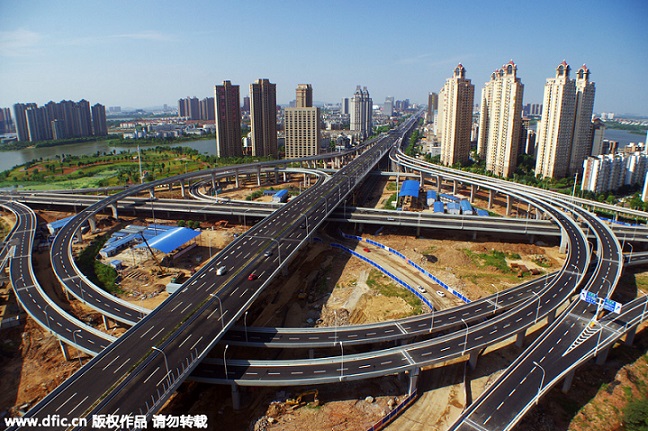 |
|
Aerial view of an overpass and elevated highways in Wuhan city, central China's Hubei province, 31 July 2015. [Photo/people.cn] |
The slowdown in China's economic growth has generated a brand-new “China threat theory”; Instead of worrying about the influence of China's speedy development in the past, some people believe that the nation has become a burden on the world economy. Exclusive interviews conducted by People's Daily argue that such accusations are far from the truth.
German entrepreneur thinks highly of China's green economy market
When returning home in November, Gerard Preper, the owner of a small business in Germany, was proud of the trophy he had received in China.
Preper attended a start-up firms competition held in Shenzhen, Guangdong Province for his patented heat engine, which can be used in steel mills, power plants and solar energy plants. Preper noted that the Chinese government attaches great importance to ecological civilization and has set ambitious targets on environmental protection and new energy development. A number of German new energy companies have entered the Chinese market, wishing to enjoy a slice of the development of the green economy in China.
Preper also established an institute called“German Technology Bridge.”He organized a dozen German start-ups to visit China last year to promote cooperation in fields of fresh water treatment, pharmacy, professional education and information technology.
Preper's story is the epitome of cooperation between China and Germany in the field of green economy. The phrases “green economy” and “environmental protection” were highlighted in the cooperative guidelines between China and Germany released last year.
Following the strategy of sustainable development raised by the government, Chinese entrepreneurs are thirsty for international cooperation, creating a huge demand for environmental friendly technology and products, said Wang Weidong, the Commercial Counselor of Chinese Embassy in Germany, told the People's Daily.
Flooding of Chinese tourists a major pillar to South Korean economy
Cosmetics counters at the Lotte duty free store in Seoul provides Chinese-language product lists, Chinese interpreters and supports Union Pay debit and credit payments for Chinese customers. In 2014,statistics indicated that the average consumption of Chinese tourists exceeded that of other nations' tourists, reaching 1.55 million won each (about $13,00). Besides, the number of Chinese tourists increased 40 percent during the past year. Tourism has become a major source of growth in the South Korean economy.
Zou Xinqiang, a vice-chairman of the South Korean tourism industry association and honorary deputy mayor of Seoul, told the People's Daily, the substantial growth of Chinese tourists helped boost South Korea's industries as a whole, from research centers, processing plants, to sales and logistics.
Statistics showed more than 100 million Chinese people traveled abroad in 2014. According to another report released by World Tourism Cities Federation (WTCF) in September, Market Investigation on Chinese Citizen Overseas Travel Consumption (2014-15), Chinese tourists accounted for 9.58 percent of total outbound travelers worldwide in 2014. The overall value of China's outbound travel consumption reached $165 billion, accounting for 11 percent of the world's travel consumption.
'Made-in-China' appears on Guinea's currency
The Central Bank of the Republic of Guinea issued a new 20,000-franc banknote in 2015, adorned with Kaleta Hydropower Station, the largest cooperative project between China and Guinea.
Constructed by China International Water and Electronic Corporation, the Kaleta Hydropower Station came into operation at the end of September. Sekou, the power plant's executive administration manager, told the People's Daily that Kaleta could produce the electricity that meets the demand of most regions of the country, especially the capital. China's investment benefits greatly the local residents.
He noted that Kaleta has employed more than 2,000 local workers, most of whom are youngsters.
Situated in Limpopo Province, South Africa,the Mamba cement project, which was built by China's Jidong Development Group, is another example of cooperation between China and African countries.
Zhang Xinghua, a project manager of Mamba cement, said there were more than 100 employees at the plant, which may later create another 400 job opportunities for local people.
Officials from local governments echoed Zhang's opinion, saying that the cement plant helped alleviate poverty, decrease unemployment and eradicate social inequity in this region.
Jaya Josie, head of the BRICS Research Centre in the National Institute for the Humanities and Social Sciences, South Africa, told the People's Daily that thanks to the Belt and Road initiative, China could transfer from Africa's largest importing country to its biggest investor in the future.
Statistics show even with a growth rate of 6.9 percent in the first three quarters, which was slightly lower than last year, China's contribution to world economy could reach 30 percent of overall growth.
